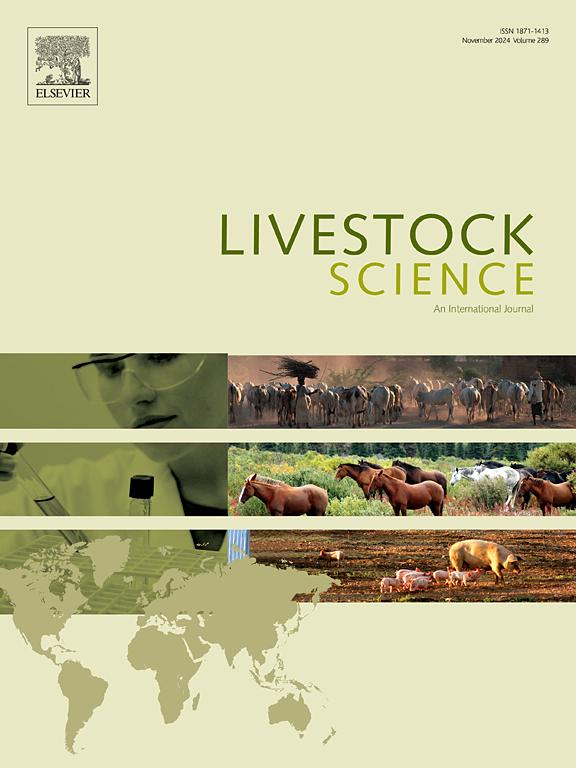Gene expression in the skeletal muscle of broilers fed diets supplemented with vitamins C and E under acute or chronic heat stress
IF 1.9
3区 农林科学
Q2 AGRICULTURE, DAIRY & ANIMAL SCIENCE
引用次数: 0
Abstract
The objective of this study was to investigate if dietary supplementation with vitamins C and E, simultaneously, can neutralize, or reduce, the effects of acute and chronic heat stress on the expression of key genes in the skeletal muscle of chickens. A total of 384 one-day-old male broiler chickens were housed in thermoneutral chambers up to 28 days of age. They were then reallocated in groups of four per cage, in three environmentally controlled chambers: two thermoneutral (22.5 and 22.6 °C) and one for heat stress (32 °C). Half the chickens in each chamber were fed a diet supplemented with vitamins C (257 to 288 mg/kg) and E (93 to 109 mg/kg). In the thermoneutral chambers, half of the chickens were pair-fed to heat stressed chickens. Real-time quantitative PCR (RT-qPCR) was performed to access gene expression in breast muscle samples after 21 h (acute) or 16 days (chronic) under heat stress. Vitamin supplementation, under acute heat stress, contributed to downregulate avUCP, MSTN, and ACLY expressions. Vitamin supplementation reduced avUCP expression with pair-feeding compared to thermoneutral controls. Chickens did not show any changes in HSP70 expression level from both heat stress experiments, probably because they have adapted quickly. Under chronic heat stress, vitamin supplementation upregulated MSTN expression, possibly to reduce muscle mass hypertrophy and, consequently, maintain homeothermy. ACLY was not differentially expressed under chronic stress. In conclusion, exposing chickens to heat stress in the grower finishing phases impacted gene expression, but not all the effects were due to the high temperature per se. Diet supplementation with vitamins C and E under stress conditions (acute heat stress or feed restriction) produced the unexpected effect of decreasing avUCP expression, possibly a metabolic adaptation to regulate the antioxidative function. Diet supplementation with vitamins C and E may assist the body in coping with the effects of heat stress on metabolism by regulating the expression of MSTN and ACLY, genes involved in the maintenance of homeothermy.
饲粮添加维生素C和E对急性或慢性热应激肉鸡骨骼肌基因表达的影响
本研究旨在探讨饲粮中同时添加维生素C和E是否可以中和或降低急性和慢性热应激对鸡骨骼肌关键基因表达的影响。将384只1日龄的雄性肉鸡饲养在恒温箱中,直至28日龄。然后,它们被重新分配为每笼4只的一组,在三个环境控制的房间里:两个热中性(22.5和22.6°C),一个热应激(32°C)。每个试验室一半的鸡饲喂添加维生素C (257 ~ 288 mg/kg)和维生素E (93 ~ 109 mg/kg)的饲粮。在热中性室中,一半的鸡被成对喂食给热应激鸡。采用实时定量PCR (RT-qPCR)检测热应激21小时(急性)或16天(慢性)后胸肌样本的基因表达。在急性热应激下,补充维生素有助于下调avUCP、MSTN和ACLY的表达。与热中性对照组相比,补充维生素降低了配对饲养的avUCP表达。在两个热应激实验中,鸡的HSP70表达水平没有任何变化,可能是因为它们适应得很快。在慢性热应激下,维生素补充上调MSTN表达,可能减少肌肉质量肥大,从而维持恒温。慢性应激下ACLY表达无差异。综上所述,在生长育肥期暴露于热应激对基因表达有影响,但并非所有影响都是由于高温本身造成的。应激条件下(急性热应激或限饲)饲粮中添加维生素C和维生素E会产生意想不到的avUCP表达降低的效果,这可能是调节抗氧化功能的代谢适应。饮食中补充维生素C和E可能通过调节参与维持恒温的MSTN和ACLY基因的表达,帮助机体应对热应激对代谢的影响。
本文章由计算机程序翻译,如有差异,请以英文原文为准。
求助全文
约1分钟内获得全文
求助全文
来源期刊

Livestock Science
农林科学-奶制品与动物科学
CiteScore
4.30
自引率
5.60%
发文量
237
审稿时长
3 months
期刊介绍:
Livestock Science promotes the sound development of the livestock sector by publishing original, peer-reviewed research and review articles covering all aspects of this broad field. The journal welcomes submissions on the avant-garde areas of animal genetics, breeding, growth, reproduction, nutrition, physiology, and behaviour in addition to genetic resources, welfare, ethics, health, management and production systems. The high-quality content of this journal reflects the truly international nature of this broad area of research.
 求助内容:
求助内容: 应助结果提醒方式:
应助结果提醒方式:


